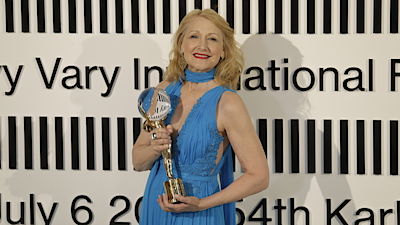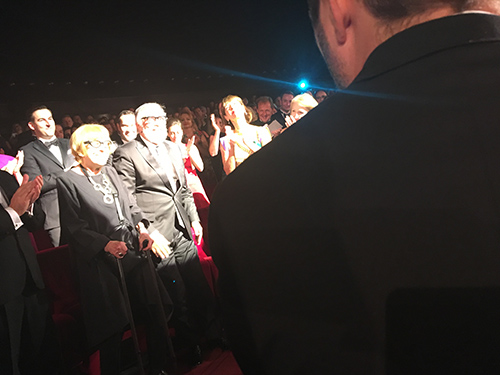Festivals 54th KARLOVY VARY INTERNATIONAL FILM FESTIVAL, 28th June-6th July 2019
Film, films and shooting films only

Karlovy Vary International Film Festival, not only the largest film festival in the Czech Republic and the most prestigious in Central and Eastern Europe, but also the second oldest film festival in Europe, has quickly been placed on the pedestal of my global festival list. The first edition of this giant A-list film institution, founded in 1946 (just a few years after Mostra Internazionale d'Arte Cinematografica della Biennale di Venezia), was held in Mariánské Lázně.and a year later it moved to Karlovy Vary, the beautiful Bohemian jewel surrounded by forests, where the famed Bond film Casino Royale (2006) was filmed, oddly playing the part of the plot supposedly set in Montenegro (Montenegro still doesn’t have and will probably not be able to produce in the foreseeable future the opulence and grandeur of the Grand Hotel Pupp).
This important cultural event has undergone modifications during its existence, including almost 40 tumultuous years of political pressures in socialist Czechoslovakia before Vaclav Havel’s revolutionary changes when a new festival team could emerge in 1994, headed by renowned Czech actor Jiří Bartoška and leading film journalist Eva Zaoralová, The festival closing ceremony paid a grand tribute to this fantastic duo by screening a warm and witty short film dedicated to their joint efforts to revamp the festival image and deservedly so, as they managed to restore the international reputation and prestige to the festival, which has become an indispensable meeting point of film industry professionals, veteran and young film critics and general public.
That the people of the Czech Republic take democracy seriously is reflected by massive protests held against prime minister Andrej Babiš in Prague for weeks before this festival’s edition, echoing perhaps the words of the grand figure of Czech and world cinema – Miloš Forman, as expressed in documentary Forman vs. Forman (special screening): “the only freedom is when you can publicly and loudly doubt its presence – where is freedom?”
With its traditional programming sections – the main competition programme of feature-length films made during the previous season, not shown in international competition at other festivals, the section East of the West, an international competition of first and second feature-length films from Central and Eastern Europe, the Balkans, Greece, Turkey, the countries of the former Soviet Union, and the Middle East shown exclusively as world, international, or European premieres, documentary section, non-competitive sections of Horizons and Another View, Imagina, Out of the past (overlooked classics), Czech films, People next Door (campaign programme, dedicated to communication with people with disabilities), Future frames: Generation NEXT OF European cinema (dedicated to promotion of student films), Midnight screenings (a selection of latest horror and action films, usually self-referential film texts), various retrospectives, homages, focuses and industry programmes – KVIFF screens about 200 films each year. Most films (except retrospectives and homages) are premieres in the Czech Republic and many are world, international, or European premieres.
The festival, also, presents a Crystal Globe for Outstanding Artistic Contribution to World Cinema to a leading personality of world cinema, “whereby the festival recognises actors and filmmakers for their inspiring work in the field of international cinema” (some of the past recipients of the award include actors Robert Redford, Robert de Niro, Michael Douglas, Danny DeVito, John Malkovich, Harvey Keitel, Morgan Freeman, Liv Ullmann, Judi Dench, Susan Sarandon, John Travolta, Mel Gibson, Richard Gere, Willem Dafoe, Jean Reno; directors William Friedkin, Miloš Forman, Stephen Frears, Nikita Michalkov, Roman Polanski, Ivan Passer, Oliver Stone, Carlos Saura, Franco Zeffirelli, Charlie Kaufman and producers Saul Zaentz and Robert K. Shaye.)
This year’s recipients of the award were two outstanding, brilliant (not enough superlatives) actresses, Julianne Moore, who received Crystal Globe for Outstanding Artistic Contribution to World Cinema at the opening ceremony (which was accompanied by stunning acrobatics and the traditional concert of the Czech National Symphony Orchestra, led by conductor Carl Davis, who played hits by The Beatles) and Patricia Clarkson, who received the award at the, equally grandiose, closing ceremony (during which the presenter jokingly played with the notion of the festival’s “snobbishness”, if the simultaneous interpretation was correct), followed by the after-party in elite Grand hotel Pupp and a refreshing reunion concert of the 1990’s Czech band (my musical discovery this year), provocatively named ‘The ecstasy of St. Theresa’.


The siege of the festival (with multiple cinemas, video library and various offices) is a giant building, a testimony to so-called ‘socialist luxury’, the hotel Thermal, which is one of Europe’s biggest screens and might be termed as the Czech equivalent of the Grand Palais in Cannes.
Special screenings
One of the many highlights outside competition programmes was screening of a restored version of classic Czech 1969 film The Cremator by Juraj Herz, once more stressing the KVIFF’s continual dedication to film classics. The films’ sharp and daring critique resonates avant-garde still today.
Another important event was a special screening of documentary film on the great film author and two-time Oscar-winner, Miloš Forman - Forman vs. Forman (which premiered at this year’s Cannes classics), directed by Helena Třeštíková and Jakub Hejna, focused on Forman’s own life and career story, with combined archival footage. The director of great film classics (the Fireman’s Ball, Loves of a blonde, Black Peter, One Flew over the cuckoo’s nest, Hair, Amadeus or The people vs. Larry Flynt), who died last year, talks of his picturesque life adventures, painful and war-torn childhood (both of his parents died in concentration camps), tumultuous political times in his home country and his subsequent exile, his career beginnings in the Hollywood, his European heritage, filmmaking creativity, his childhood friendship with Vaclav Havel and his return to the Czech Republic after the Velvet revolution etc. “Happiness is abstract, when I get there I’m disappointed”, says Forman towards the end of the film.
Industry events
Besides its various segments of workshops, panels and talks, the primary focus of KVIFF’s Eastern Promises consists of 4 different programmes, each of them showing carefully selected projects in various stages of development: Works in Progress is focused on selected feature films, where producers and directors from the countries of Central and Eastern Europe, the Balkans, the former Soviet Union, the Middle East and North Africa present their projects, expected to premiere after the festival (at upcoming festivals such as Sundance, Toronto, Venice, Rotterdam or Berlinale), awarding the most promising one with a combined prize of 100,000 EUR. Works in Development – Feature Launch awards the best pitch with 10,000 EUR, for development of first or second feature films looking for coproduction, within the MIDPOINT Feature Launch network. Eurimages Lab Project Award encourages filmmakers who do not fit into a typical funding box or transgress the traditional production framework, awarding the best project 50,000 EUR. Docs in Progress presents promising creative documentary projects that are currently in production or post-production and will officially premiere after KVIFF, awarding the best project 5,000 EUR.
Another Hollywood star guest, Casey Affleck, returned to the festival with his directorial debut Light Of My Life, which premiered in Berlin,
Montenegro’s film presence in KVIFF
This year was also marked by an increased presence of Montenegrin film professionals at KVIFF. Montenegrin feature debut director Ivan Bakrač and producer Ivan Đurović presented their project After the winter (Nakon zime) in the programme “Works in progress”, held on 1st and 2nd July. The film is focused on twenty-something friends living scattered across the former Yugoslavia, who are “rising up against patriarchal heritage, and ignoring the consequences of war and the poor economic environment. This is a story about a vanishing world, and a nostalgic and humorous ode to friendship and youth. The movie is structured around three friendships taking place in different seasons, all coming together in the epilogue as winter creeps in, in circumstances which the protagonists have no influence over,” Bakrač explains. The film is produced by Artikulacijaand ABHO Film, the project was supported by Creative Europe MEDIA and Film Centre of Serbia and the release is scheduled for February 2020.
The following projects were presented:
- Pigeon’s Milk - Eugen Maryan (Russia/Moldova)
- After the Winter - Ivan Bakrac (Montenegro/Serbia)
- Atbay’s Fight - Adilkhan Yerzhanov (Kazakhstan)
- I Never Cry - Piotr Domalewski (Poland)
- Intervention - Ksenia Zueva (Russia)
- Looking for Venera - Norika Sefa (Kosovo)
- Otar’s Death - Ioseb Bliadze (Georgia/Germany/Lithuania)
- Siege on Liperti Street - Stavros Pamballis (Cyprus/Greece)
- The Forgotten - Daria Onyshchenko Gold (Ukraine/Switzerland)
This year’s edition jury, consisting of Khalil Benkirane, of the Doha Film Institute, producer Aija Berzina and Virgini Devesa, from Alpha Violet, awarded the Russian-Moldovan co-production Pigeon’s Milk by first-time director Eugen Marian with the prize worth €100,000.
Montenegro was also present as a coproduction partner for film Mamonga (directed by: Stefan Malešević Serbia / Bosnia and Herzegovina / Montenegro, 2019), screened in East of the West competition programme.
|
Industry statistics the KVIFF has 12521 accredited participants, of whom: Festival Pass: 10363 |


